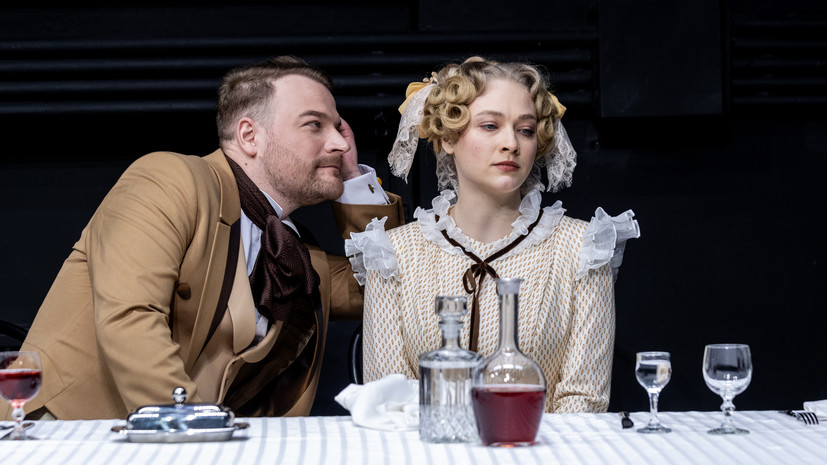On February 24, the State Academic Theater named after Mossovet will host the premiere of the sentimental comedy “The Married Bride.”
The performance is based on the play “One’s Own Family, or The Married Bride,” written in 1817 by Alexander Shakhovsky with the participation of Alexander Griboyedov and Nikolai Khmelnitsky.
The work tells about the life of Russian nobles at the beginning of the 19th century.
The stage director was the artistic director of the theater, Evgeniy Marcelli.
According to him, the idea to stage the play came from the troupe’s artists: they studied it themselves, presented their ideas to the director, and he, in turn, realized that it would make an excellent, funny performance.
“The plot of this play is a non-standard story for me, there is no negativity in it, no negative characters.
This is a kind, gentle, almost Christmas tale about a large family, whose members take the arrival of a new person in their circle very seriously.
As a result, it turns out that there are no strangers,” Marcelli is quoted as saying on the theater’s website.
In the story, Varvara Savvishna Veldyuzeva gathers her family - her sisters, brother and aunt - and reports that she received a letter from her nephew Lyubim, who lives in St. Petersburg.
In the message, the young hussar asks his relatives for permission to marry.
He met a beautiful girl, Natasha, an orphan raised by a countess.
However, the family opposes this marriage, without even meeting the bride, and each relative has his own reasons for this: some believe that the girl is too educated, which means she will make fun of ordinary people, others are disgusted by letting a young girl into the family a person who grew up in a noble house, and therefore is accustomed to spending money on everything, while others believe that the girl is too stupid and will not fit into their circle.
But no one in the family knows that Lyubim and Natasha arrived earlier and now from the next room they hear the bickering of the young man’s relatives.
Lyubim asks her aunt not to tell her family that they are already married.
Veldyuzeva, meanwhile, comes up with a plan: Natasha will need to pretend to be another person and charm everyone in the family so that their union is approved.
The cast of the play included Alexander Bobrovsky and Oleg Kuznetsov, Tatyana Rodionova and Larisa Naumkina, Valentina Kareva, Marina Kondratyeva, Andrei Rapoport, Sergei Zotov and Pavel Usachev, Ekaterina Devkina, Evgenia Lyakh.
The theater artists, led by Evgeniy Marcelli, managed to do everything subtly, competently and cheerfully.
The story turned out to be humorous, instructive and even relevant at the same time, because such family conflicts often arise.
Performance “The Married Bride”
© Elena Lapina / Mossovet State Academic Theater
The performance lasts only one hour and 20 minutes, but this time is enough to reveal each character.
None of the characters seem superfluous or unnoticeable.
Even the serf girl Grunka, in the absence of words, is remembered by her behavior and facial expression.
For example, at the very beginning, the audience sees how diligently she sets the table in anticipation of guests: her movements are neat, smooth, and her face is calm and concentrated.
But as things happen, Grunka, whose role is played by Evgenia Lyakh, begins to show with all her appearance how tired she is of the arguments between the hostess of the house and her guests.
At the end, the heroine completely takes out the basin with the dishes and throws it on the table with comical anger.
Each of the characters can be loved for something different: Veldyuzeva for her kindness and condescension, Varvara Savvishna for her subtlety of soul and dreaminess, Loved for his mischief and charisma, and Aunt Matryona Karpovna attracts with her good spirits and love of entertainment, despite her old age.
However, Natasha, played by Ekaterina Devkina, shines most on stage.
According to the plot, her heroine is looking for a spiritual kinship with each of her husband’s family, thereby showing that she is not a stranger.
In other words, the actress must play a little of each of the characters.
The scene is especially striking when Natasha, in order to demonstrate her education, answers Maxim Merkurievich’s questions and names many names of philosophers, geographical objects and much more.
In addition, the emotional scene at the end of the play is impressive, when Natasha, sobbing, proves to her husband’s family that she is who she showed herself to be.
The director of the theater orchestra, Matvey Kostolevsky, deserves special attention.
His character, the Pianist, appears on stage playing the instrument only twice, but the viewer may even feel a little sad that the music he performs does not last long.
The performance would not have been so spectacular without the most beautiful outfits, for which costume designer Andrei Klimov is responsible.
“The Married Bride” is a light and cheerful performance that can captivate the audience, make them forget about the outside world for an hour and a half and plunge into the 19th century, laugh, maybe even see themselves or their relatives in one of the characters, and be filled with positive emotions and relax.
This is the case when there is meaning and vitality behind great humor.

